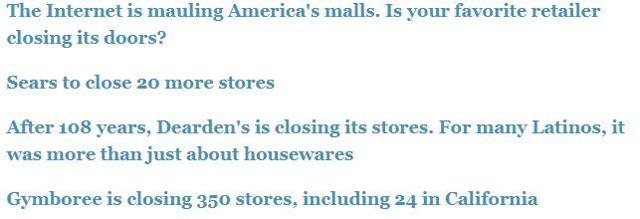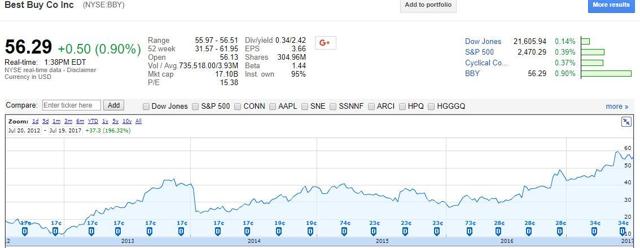Below is a preview of my latest article on Seeking Alpha. It’s short but good. Best Buy was considered dinosaur in 2012 and they managed to turnaround the business. How did they do it? They are now thriving.
I’m not a shareholder but I’m interested in the story.
*Note from the author: This is my first published article since 2016. I’ve received numerous great comments in the past, and some of my followers have asked where my next article was. Writing is a hobby for me. Here’s my breakdown on Best Buy’s turnaround.
For the full article click here.
Repost from Seeking Alpha
By Brian Langis
Every day it seems that I’m reading about a brick-and-mortar business heading for the slaughterhouse. If you have been out of the loop, here are some sample headlines just from the LA Times:
 Source: LA Times
Source: LA Times
Despite what seems to be the retail apocalypse of the brick-and-mortar store, a success story has gone unnoticed and deserves more attention. You probably noticed that your local Best Buy (BBY) is actually not dead and is doing just fine. Best Buy, once a struggling business, managed to successfully turn around its business. The Best Buy turnaround story should be a case study. In it are plenty of lessons for the businesses looking to fight off the online juggernauts. This led me to further study how Best Buy managed to avoid the pitfalls that ailed many other brick-and-mortar retail chains.
A few years ago Best Buy was going down the tube like many of its peers (e.g. Circuit City, Radio Shack). Best Buy was a victim of “showrooming”; Consumers would show up in stores to check out the product to end up purchasing it online at a better price. As a result, sales and profits slumped, and Amazon would just take more market share. In this 2012 article from the LA Times, the author claimed he got a better deal for a fridge at Sears. When you are losing sales to Sears, you are in trouble. Below is the Best Buy five year chart:
 Best Buy is up 4x since late 2012, far outpacing the broader market.
Best Buy is up 4x since late 2012, far outpacing the broader market.
Back in 2012 Best Buy was trading at around $11 with a quarterly dividend of $0.17 per share. It’s now trading upward of $56 with a quarterly dividend of $0.34 per share. So how did Best Buy manageto quadruple its stock price, double its dividends in five years when many people (including me) thought this company was going straight for the cemetery, another victim of Amazon.com and other online sellers?
What are some the lessons?
For the full article click here.











